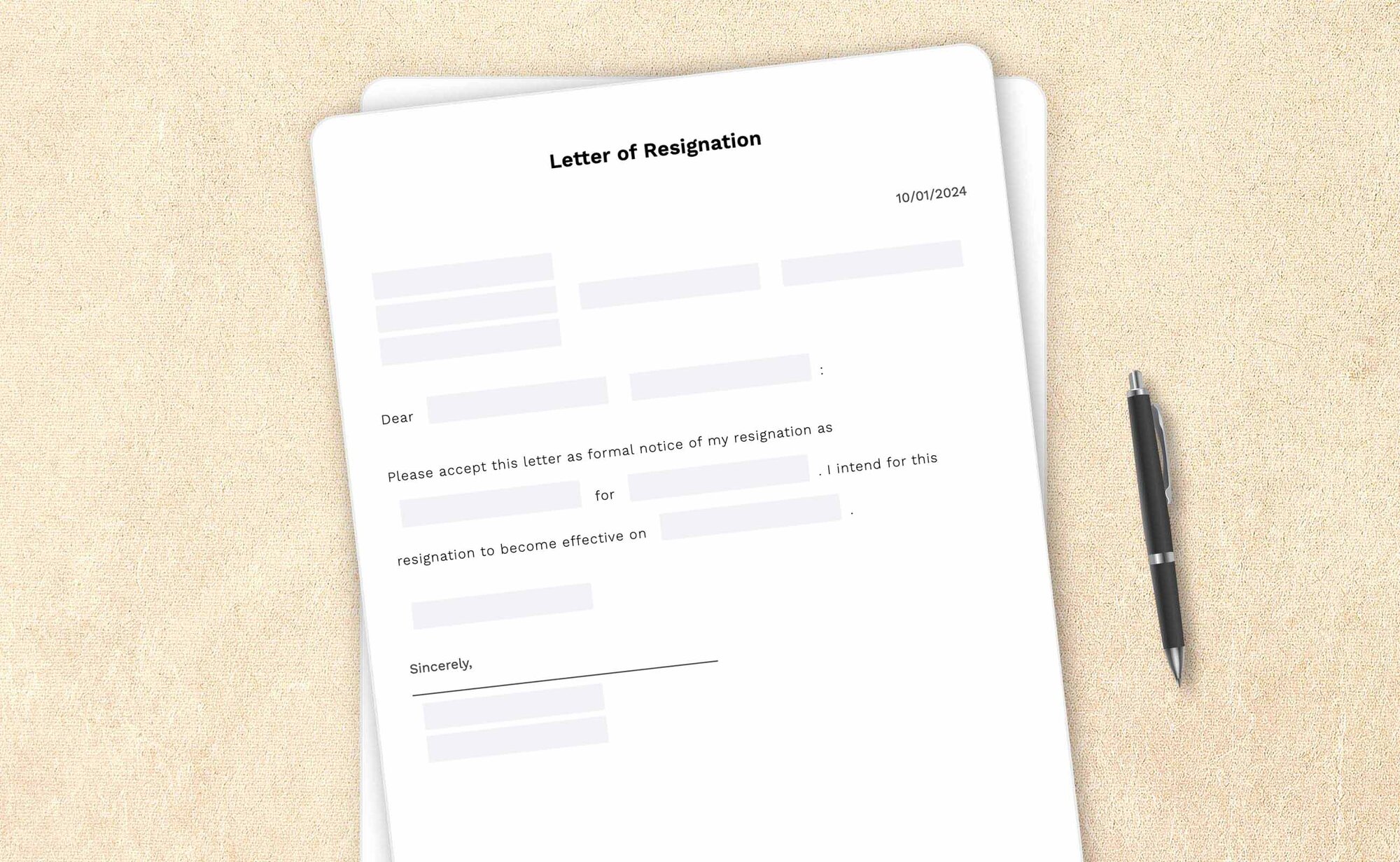Dear
Please accept this letter as formal notice of my resignation as
| Sincerely, |
| __________________________________________ |
How-to guides, articles, and any other content appearing on this page are for informational purposes only, do not constitute legal advice, and are no substitute for the advice of an attorney.
Resignation letter: How-to guide
Lifetime employment at one company is no longer a business norm, and individuals decide with increasing frequency that a new job may provide fresh and different benefits. Once an employee has made the decision to move on, their supervisors must be informed of this decision. In such cases, a resignation letter may be required.
Although it may seem an archaic formality, resignation letters signal respect and consideration and reflect well on an individual and their character. This can prove useful in later years, as references may be required in further job searches, and an employee’s farewell actions can make a lasting impression on a company.
If you follow the suggestions provided, you'll show consideration for your former employer, establishing a tone of mutual respect and laying the foundation for a future business relationship. Inappropriate behavior, whether by thoughtless letters or ignored formalities, will only hurt your career. A well-constructed resignation letter will allow you to maintain your business reputation. In the end, you know your situation better than anyone else.
Best practices when writing a professional resignation letter

1. Include the right formal title
While writing a professional resignation letter, you should address the person with Mr./Mrs./Ms. followed by their last name. If you work in a less formal office and use your supervisor’s first name, you may address the letter as “Dear Mr. [first name] or Dear [first name].”
2. Keep it simple
Keep the letter short, simple, and sweet. A resignation letter isn't the place to criticize an employer or provide negative feedback about a job experience. If you feel it is necessary, bring this information to light in an exit interview or other face-to-face forum. Your letter will probably be kept in your personnel file and will remain an essential part of your employment history. Hence while writing a letter of resignation, it is important that you keep it on a positive tone.
3. Avoid reference requests
In a formal resignation letter, don't include a request for a reference. Address such requests in different correspondence or in person.
4. Keep a positive relationship
Although it isn’t absolutely necessary, consider including a couple of positive remarks in your resignation letter.
5. Inform about your notice period
Be sure to give sufficient advance notice of your departure, allowing your employer enough time to find and train your replacement. Generally, a notice period is between two and four weeks, but the time may be more or less depending on your industry and the nature of your employment. Review your employee handbook and your employment contract to see if there are specific notice requirements in place at your company.
6. Offer help for a smooth transition
When you decide to resign from your current employment, you can always help with the transition process. Offer to help locate or train your replacement. This will emphasize your conscientiousness and leave a lasting positive impression on your company.
7. Keep it confidential
Don't discuss your resignation with your co-workers before providing formal notice in a written letter to your supervisor. If this information is leaked before you have the chance to provide it, it'll reflect poorly on you.
8. Maintain professionalism
Sign your letter and seal it in an envelope. It is recommended to hand a printed letter to your supervisor in person. Don't send your resignation via e-mail unless you have informed your supervisor face to face. Note that your boss may wish to discuss your departure and future plans in person, and you should allow time for this discussion. As in the letter itself, keep the conversation about your resignation professional and courteous.
9. Share your contact information
After you have become comfortable in your new position, provide your former supervisor, human resources department, and co-workers with your updated contact information. This will allow your business network to continue growing and make any future job searches or other commercial opportunities easier.
Though you need to be careful when you write a resignation letter, the job becomes much easier if you have a resignation letter template to get you started. To make the process easier, use the resignation letter format provided at the top of this page. Answer a couple of guided questions and download the document created for future use.
Besides the resignation letter, LegalZoom also provides you with other letter templates that you can use for your next employment, such as job offer acceptance and rejection letters.
Frequently asked questions
What's a resignation letter?

When you get an opportunity to work in a new company, you must notify your current company formally that you wish to leave. And this can be done by writing a simple resignation letter. A well-written and thoughtful note reflects well on your character and allows you to maintain your reputation. A resignation letter will help you to leave a good impression and lay the foundation for future opportunities with the former employer.
What details should you keep in handy before writing a resignation letter?
Here's the information you'll need to have handy to complete your resignation letter:
- Have your supervisor's name and contact information ready. If you need to include other people, such as HR or other colleagues, have their names and titles ready.
- You also need to include your decision to resign, your last day at work, and a list of projects you intend to finish before you leave.
How do I write a good resignation letter?
To write a good resignation letter, start with a clear and concise statement of your intention to resign, specifying your last day of work. Express gratitude for the opportunities and experiences gained during your tenure, and if desired, provide a brief, positive explanation for your decision. If applicable, offer assistance during the transition period, and maintain a professional and respectful tone throughout the letter. Personalize the letter to demonstrate sincerity, and conclude it on a positive note.
How do I write a short resignation letter?
When crafting a short resignation letter, aim for brevity while including essential elements. Begin with a direct statement conveying your decision to resign and the date of your last working day. Express your appreciation for the opportunities provided by the company, and if desired, provide a brief reason for your departure. Keep the tone professional and positive, omitting unnecessary details.
What is a good resignation letter for personal reasons?
Crafting a thoughtful resignation letter for personal reasons involves maintaining a delicate balance between transparency and professionalism. Begin by expressing your decision to resign due to personal circumstances with a brief and respectful explanation without divulging unnecessary details. Clearly state your last working day and emphasize your gratitude for the support and experiences gained during your time with the company.
